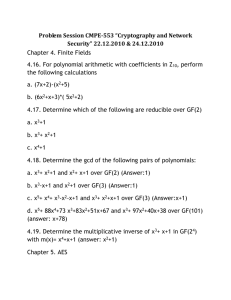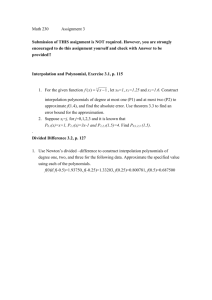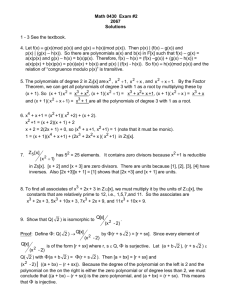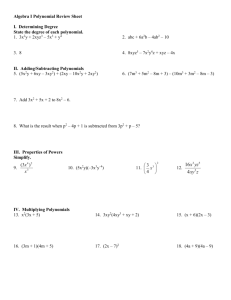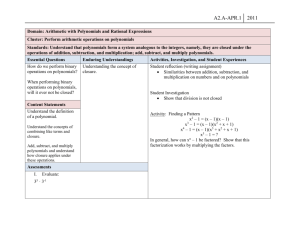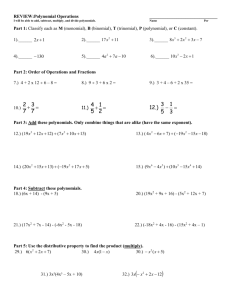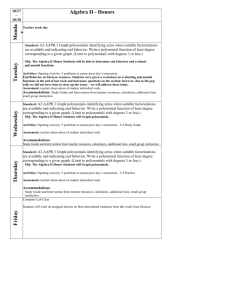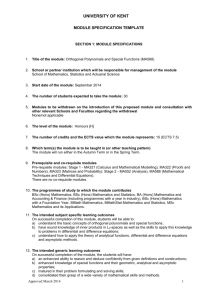F.BF.A.1 Lesson Building Polynomial Functions
advertisement
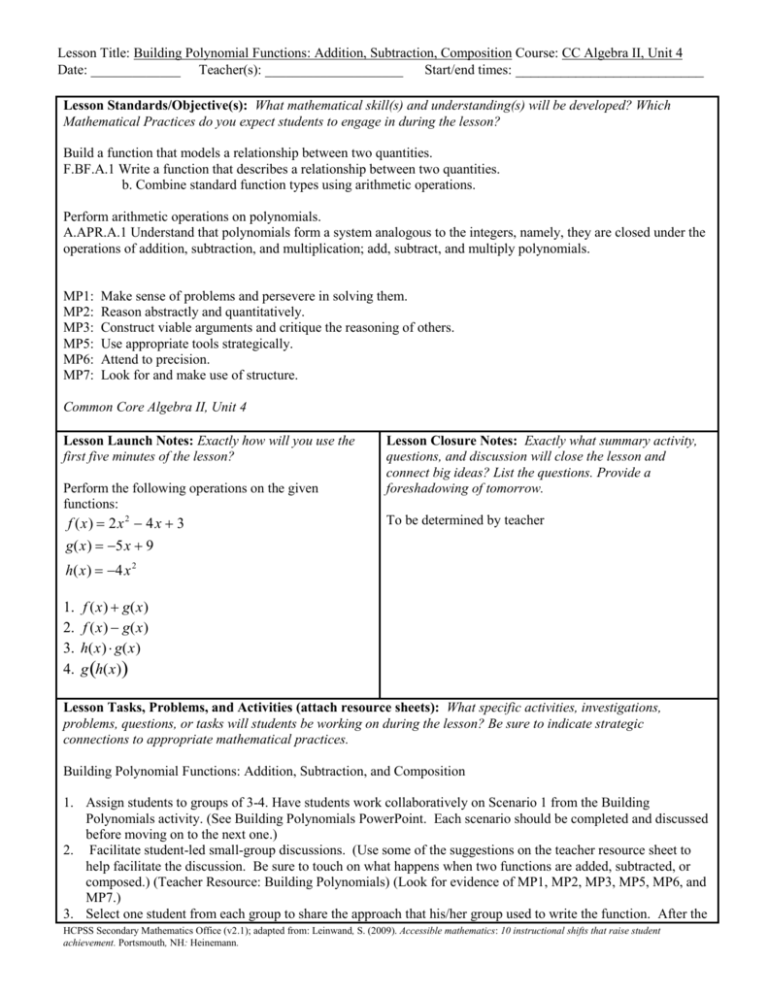
Lesson Title: Building Polynomial Functions: Addition, Subtraction, Composition Course: CC Algebra II, Unit 4 Date: _____________ Teacher(s): ____________________ Start/end times: _________________________ Lesson Standards/Objective(s): What mathematical skill(s) and understanding(s) will be developed? Which Mathematical Practices do you expect students to engage in during the lesson? Build a function that models a relationship between two quantities. F.BF.A.1 Write a function that describes a relationship between two quantities. b. Combine standard function types using arithmetic operations. Perform arithmetic operations on polynomials. A.APR.A.1 Understand that polynomials form a system analogous to the integers, namely, they are closed under the operations of addition, subtraction, and multiplication; add, subtract, and multiply polynomials. MP1: MP2: MP3: MP5: MP6: MP7: Make sense of problems and persevere in solving them. Reason abstractly and quantitatively. Construct viable arguments and critique the reasoning of others. Use appropriate tools strategically. Attend to precision. Look for and make use of structure. Common Core Algebra II, Unit 4 Lesson Launch Notes: Exactly how will you use the first five minutes of the lesson? Perform the following operations on the given functions: f (x) 2x 2 4 x 3 Lesson Closure Notes: Exactly what summary activity, questions, and discussion will close the lesson and connect big ideas? List the questions. Provide a foreshadowing of tomorrow. To be determined by teacher g(x) 5x 9 h(x) 4 x 2 1. 2. 3. 4. f (x) g(x) f (x) g(x) h(x) g(x) g h(x) Lesson Tasks, Problems, and Activities (attach resource sheets): What specific activities, investigations, problems, questions, or tasks will students be working on during the lesson? Be sure to indicate strategic connections to appropriate mathematical practices. Building Polynomial Functions: Addition, Subtraction, and Composition 1. Assign students to groups of 3-4. Have students work collaboratively on Scenario 1 from the Building Polynomials activity. (See Building Polynomials PowerPoint. Each scenario should be completed and discussed before moving on to the next one.) 2. Facilitate student-led small-group discussions. (Use some of the suggestions on the teacher resource sheet to help facilitate the discussion. Be sure to touch on what happens when two functions are added, subtracted, or composed.) (Teacher Resource: Building Polynomials) (Look for evidence of MP1, MP2, MP3, MP5, MP6, and MP7.) 3. Select one student from each group to share the approach that his/her group used to write the function. After the HCPSS Secondary Mathematics Office (v2.1); adapted from: Leinwand, S. (2009). Accessible mathematics: 10 instructional shifts that raise student achievement. Portsmouth, NH: Heinemann. Lesson Title: Building Polynomial Functions: Addition, Subtraction, Composition Course: CC Algebra II, Unit 4 Date: _____________ Teacher(s): ____________________ Start/end times: _________________________ students share, debrief the class to pull together big ideas. (Look for evidence of MP2, MP3, and MP6.) Evidence of Success: What exactly do I expect students to be able to do by the end of the lesson, and how will I measure student success? That is, deliberate consideration of what performances will convince you (and any outside observer) that your students have developed a deepened and conceptual understanding. Students should be able to apply addition, subtraction, and composition of functions when given a scenario. Students should be able to write a new function using the given scenarios. Students should be able to simplify polynomial expressions within each of the functions created in the scenarios. Notes and Nuances: Vocabulary, connections, anticipated misconceptions (and how they will be addressed), etc. This is a follow-up lesson for students to practice applying addition, subtraction, and composition of functions. Composition of functions: 1. Students may need reminders about function notation. 2. Students may have some difficulty with information presented as an application. 3. Students may have some difficulty recognizing how to apply the functions provided within the application scenarios. Resources: What materials or resources are essential for students to successfully complete the lesson tasks or activities? Homework: Exactly what follow-up homework tasks, problems, and/or exercises will be assigned upon the completion of the lesson? Teacher Resource: Building Polynomials PPT Building Polynomials Student Resource LCD Projector Calculators To be determined by teacher Lesson Reflections: How do you know that you were effective? What questions, connected to the lesson standards/objectives and evidence of success, will you use to reflect on the effectiveness of this lesson? Were the students able to identify the appropriate operations from the given scenarios? Were the students able to successfully create a function given the information in the scenarios? Were the students able to explain how they created the functions from the given scenarios? Howard County Public Schools Office of Secondary Mathematics Curricular Projects has licensed this product under a Creative Commons Attribution-NonCommercial-NoDerivs 3.0 Unported License. HCPSS Secondary Mathematics Office (v2.1); adapted from: Leinwand, S. (2009). Accessible mathematics: 10 instructional shifts that raise student achievement. Portsmouth, NH: Heinemann.

